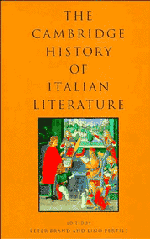Book contents
- Frontmatter
- Origins and Duecento
- The Trecento
- The Quattrocento
- The Cinquecento
- The Seicento: Poetry, Philosophy and Science
- Narrative prose and theatre
- The Settecento
- 22 The first half of the Settecento
- 23 The theatre from Metastasio to Goldoni
- 24 Opera
- 25 The Enlightenment and Parini
- 26 Alfieri and pre-Romanticism
- The Age of Romanticism (1800–1870)
- The Literature of United Italy (1870–1910)
- The Rise and Fall of Fascism (1910–45)
- The Aftermath of the Second World War (1945–56)
- Contemporary Italy (since 1956)
- Bibliography
- References
26 - Alfieri and pre-Romanticism
from The Settecento
Published online by Cambridge University Press: 28 March 2008
- Frontmatter
- Origins and Duecento
- The Trecento
- The Quattrocento
- The Cinquecento
- The Seicento: Poetry, Philosophy and Science
- Narrative prose and theatre
- The Settecento
- 22 The first half of the Settecento
- 23 The theatre from Metastasio to Goldoni
- 24 Opera
- 25 The Enlightenment and Parini
- 26 Alfieri and pre-Romanticism
- The Age of Romanticism (1800–1870)
- The Literature of United Italy (1870–1910)
- The Rise and Fall of Fascism (1910–45)
- The Aftermath of the Second World War (1945–56)
- Contemporary Italy (since 1956)
- Bibliography
- References
Summary
Alfieri
Together with Parini, the writer most admired by the Risorgimento patriots as the man who restored a civil and political conscience to Italian culture was Vittorio Alfieri (Asti, 1749 – Florence, 1803). After a period of restless and inconclusive study at the military academy in Turin, the favoured place of education of northern aristocrats, Alfieri visited various parts of Italy and Europe between 1766 and 1775, ‘about ten years of travel and dissolute conduct’ as he was to write in his autobiography: in other words, not the usual Grand Tour of young Settecento travellers but a continual flight from his own anxiety and discontent in a search for serenity and peace within himself which continued to elude him.
The third part of his Vita (‘Giovinezza’, ‘Youth’) provides some fleeting and revealing glimpses of his headlong dash across Europe: occasional encounters that would prove decisive for his intellectual development, as with Tomaso Valperga di Caluso in Lisbon; stormy love affairs that drag him into dangerous situations, like the duel with Penelope Pitt's husband in London; his disgust and contempt for the various courts of the ancien régime and their fawning, powdered courtiers; desultory reading, especially of French writers and philosophes; his liking for the desolate and stormy landscapes of Scandinavia and the bleak countryside and proud people of Spain.
- Type
- Chapter
- Information
- The Cambridge History of Italian Literature , pp. 387 - 396Publisher: Cambridge University PressPrint publication year: 1997

